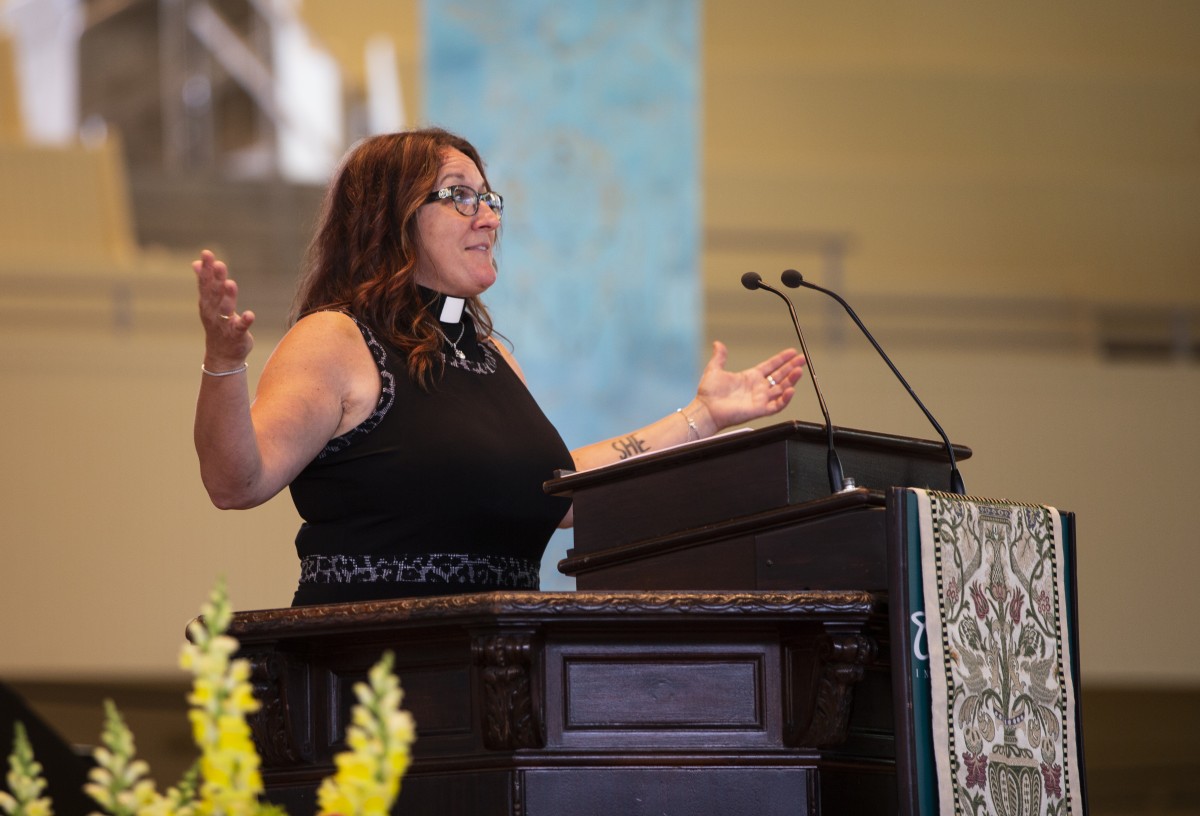“For all the times we have seen it on posters at football games, placards and bumper stickers, what Tim Tebow has painted under his eyes, we have convinced ourselves that it can’t be true,” said the Rev. Karoline M. Lewis at the 9:15 a.m. Monday June 25 morning worship service in the Amphitheater.
Her text was John 4:1-6, and her sermon title was “Going to Sychar.”
The verse she was referring to was John 3:16: “for God so loved the world…”
Noting that she was a math major in college, Lewis reminded the congregation that three comes before four, and John 3 comes before John 4.
“Without John 3:16, why Jesus had to go to Samaria (in chapter four) makes no sense,” she said.
Jesus had been in Jerusalem for Passover, where he met Nicodemus, aka “Nick at Night.” After his lengthy response to Nicodemus, Jesus decided to go back to Galilee by way of Samaria. It was necessary for Jesus to go, Lewis said, but if you get out a Bible atlas or looked for Samaria on Google Maps, there are many other routes from Judea to Galilee that did not go through Samaria.
As Lewis said in her Sunday sermon, no Jew in his or her right mind would go to Samaria because Samaritans live in Samaria. It was a rift that went back centuries.
“Jews don’t share things with Samaritans, which is about the biggest understatement in the Bible,” Lewis said.
Jesus went to Samaria because “God so loved the world.” This was not sentimental or hypothetical love, Lewis said; not just a nice idea to make God a palatable, amicable, likeable deity.
“Jesus means it literally, and the sooner we realize it, the better,” she said.
This is what the world looks like, Jesus said. The last person you would think that God could love is a Samaritan woman, an outsider, a political nuisance, a social outcast.
“Did I mention she was a woman?” Lewis said.
Jesus’ disciples were astonished that he was speaking to a woman.
“Jesus went to Samaria because he needed a witness, and she is the witness Jesus needed,” Lewis said. “She was the witness the disciples needed to see, and she was the witness that Sychar needed to hear.”
God is persistent when he has someone in mind. But going to Sychar is never easy.
“We keep God on the sidelines because he pushes us into spaces and places we do not want to go,” Lewis said.
By going to Sychar, Lewis said, we are faced with our own prejudices, biases and ideologies. Suspicions are exposed so the truth cannot hide.
“Jesus intrudes, finds a way into our seclusion, into the barricades that justify our fear and doubt,” Lewis said. “God meant it — ‘I love the world and I became Jesus to love it as only God in the flesh can do.’ ”
Going to Sychar means being vulnerable, being put in a position of need and dependence, being forced to ask for what is necessary for survival.
It was April, and the Samaritan woman was the only one able to provide Jesus with water in the desert.
“Something happened,” Lewis said. “Polarization became potential, acrimony became agreement and suspicion became friendship. Both of them were changed.”
Lewis said that this story of Jesus and the woman of Samaria is her “favorite story ever!” She discovered an icon with Jesus and the woman both holding the cup over the well.
“You can’t tell who is offering the cup to whom,” she said of the icon. “It is a moment of salvific reciprocity.”
In going to Sychar, Lewis said, “you might indeed find someone who need saving, but don’t be surprised that it is you who need saving yourself.”
The Rt. Rev. V. Gene Robinson, vice president of religion, presided. The Rev. Tara Lamont Eastman, pastor of Tree of Life Evangelical Lutheran Church in Jamestown, read the scripture. Jared Jacobsen, organist and coordinator of worship and sacred music, directed the Chautauqua Choir in “With a Voice of Singing” by Martin Shaw. The Jackson-Carnahan Memorial Chaplaincy provides support for this week’s services.





